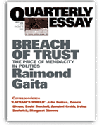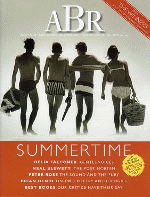The March 2007 issue of "The Australian Literary Review" is published this week as a supplement to Wednesday's "The Australian" newspaper, and I'm somewhat disappointed with it.
I'll admit up-front that the bulk of my reading is fiction, of one genre or another, so I tend to skim through the contents of literary journals such as this looking for the reviews that will appeal to me. I realise they aren't going to be full of the stuff I want but do assume that, normally, fiction will appear there somewhere. Well, not this month it won't. This month it's wall-to-wall non-fiction.
If you've been reading between the lines of some comments I've made in my "Weekend Round-up" posts over the past few months, you will have noticed that I haven't been mentioning very many works of fiction over that time. I have just been putting this down to a lack of new Australian fiction hitting the market. That might be the case for a week-on-week book review section of a major newspaper, but a monthly? Surely not. Surely there is enough around in any given month to score a mention of some sort.
In order to put this into context I thought I'd compare "The Australian Literary Review" with the other major Australian literary review journal in an attempt to come to some sort of conclusion. The other journal under consideration is "Australian Book Review".
I've mentioned ABR on this weblog from time to time. For a long period it has been the prime and premier source of book reviews in this country. It's a glossy, monthly magazine, about quarto sized, chock full of book reviews, which, until recently, appeared to be solely Australian in nature (writer, subject, publisher or context). It's reviews are grouped within each issue by subject, and the March 2007 issue contains the following: Memoir, Middle East, Politics, Media, Art, Sociology, Cultural Studies, Music Fiction, Literary Studies, Reference, Australian History, Journals and Poetry. (Please note, I've left out a few sections here - sections which are specific to this journal - such as letters, prizes and lectures. I'm concentrating on the reviews). Each of these sections contains detailed reviews of several books, a total of 27 in all.
"The Australian Literary Review" follows a similar layout with its reviews, though, in this case, the journal is printed on tabloid-sized newsprint, with each page being approximately twice the size of those in ABR. The sections it covers this month are: Politics, Economics, Education, Religion, Literature, and Biography. A total of 13 books.
You'll see a difference in the number of books under review for a start. Don't take a lot of notice of this, that isn't really what I'm interested in. And if you get bogged down simply on overall numbers you'll miss the point. The point is that ABR reviews 3 works of fiction this month and the ALR none.
It's not that there isn't any "worthwhile" fiction around to review, (the ABR looks into the new Tom Keneally, the latest Steven Carroll and a first novel by Lindsay Simpson), so we have to assume that a specific decision was made not to review any fiction in ALR this month - which is worrying enough - or, worse still, that the lack of fiction reviews has something to do with the journal's association with "The Australian" newspaper. In other words, maybe fiction reviews aren't being published in the ALR because they've already been covered in the weekend editions of the newspaper.
I got the idea when the ALR was re-launched last year that it was aiming to have a fair degree of independence, so this last possibility is especially worrying as it implies that editorial policies of the ALR are being dictated by what is, and is not, reviewed in the main paper. If this is the case then there should be some correlation between the number of fiction titles reviewed in "The Australian" over the past few months, and the lack of any in ALR this month. A quick search back over the afore-mentioned "Weekend Round-up" posts for January and February shows that the "Weekend Australian" reviewed a total of 4 novels in that time - I missed a week so it might have slightly higher, I doubt by much. Which tends to suggest that the main paper isn't reviewing much in the way of Australian fiction either.
Yet, if you venture back only as far as October last year, when this version of the journal was launched, the ALR reviewed 6 fiction titles in one issue.
So, let's assume that the ALR is trying to stand on his own two feet, and that it is making its own decisions, without regard to what is happening in its parent publication. And in that event I wonder what sort of audience they are currently aiming at. I would tend to suggest it's not one that reads a lot of fiction. It's not me.


